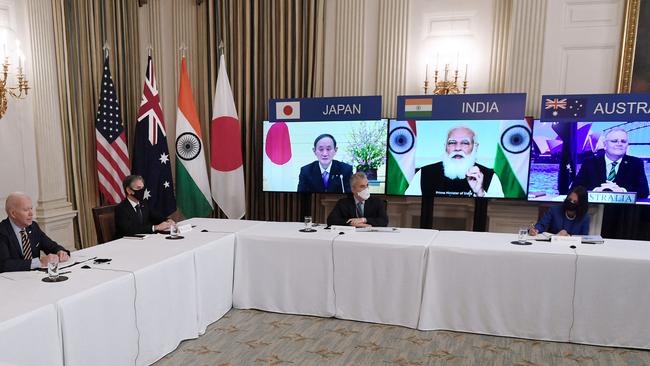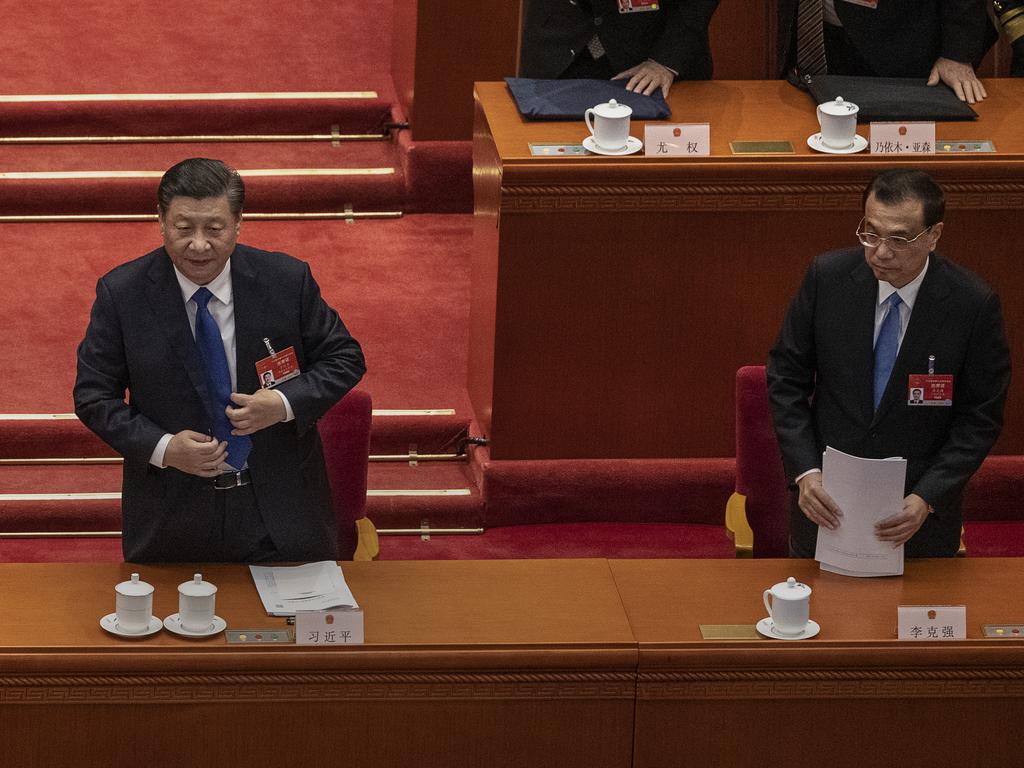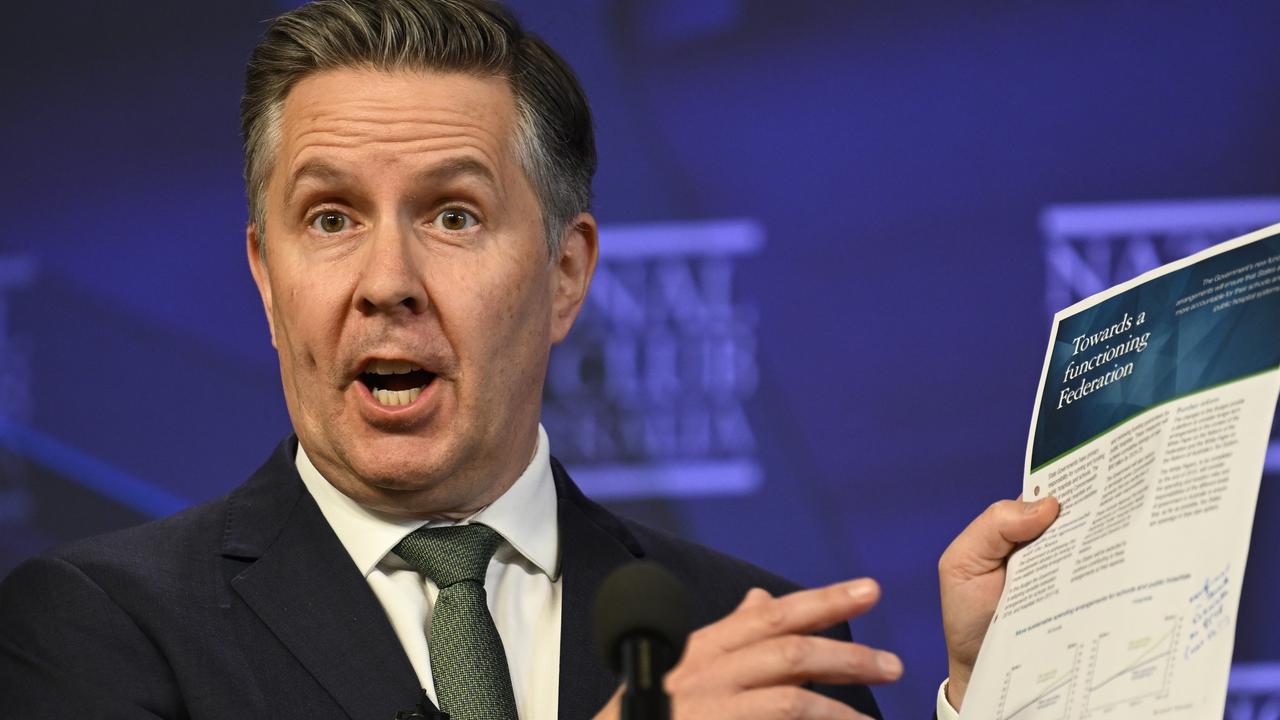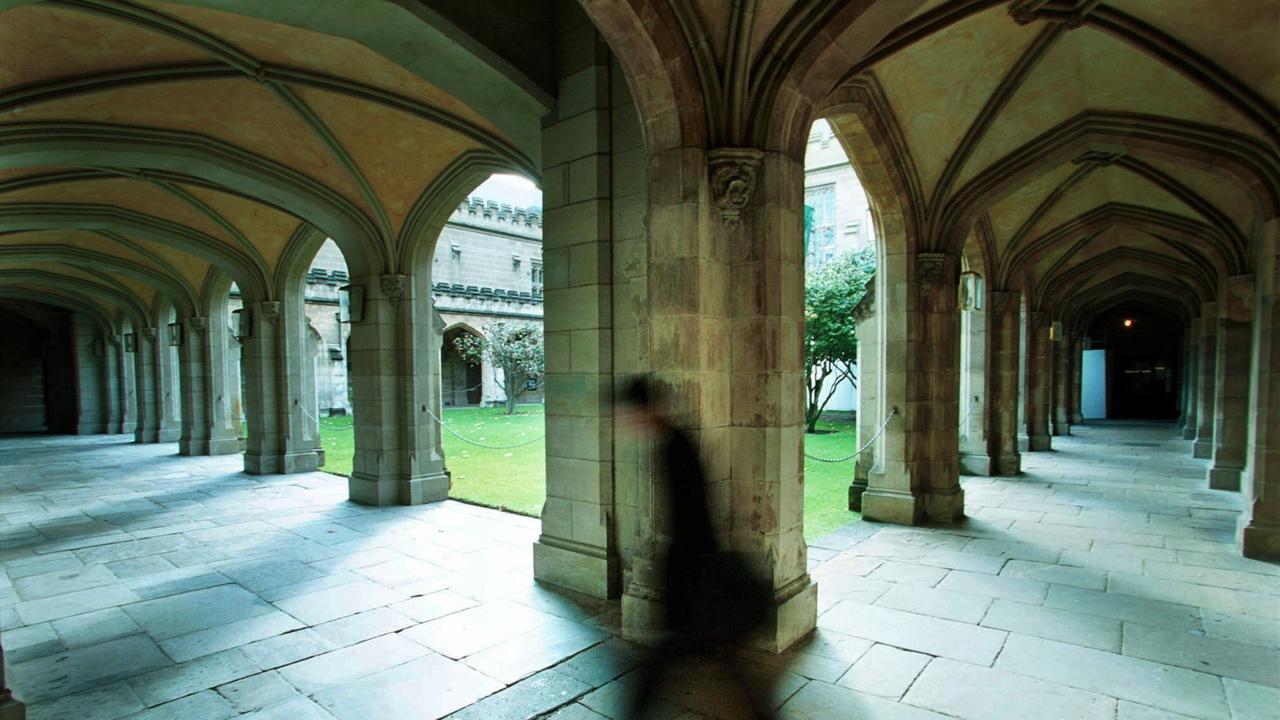Quad leaders take charge on security
Covid, climate change and deeper co-operation on agenda amid heightened tensions with China.
Australia, Japan, India and the US will manufacture and roll out COVID-19 vaccinations across the region and hold regular face-to-face leaders’ meetings in a deepening of democratic co-operation at a time of heightened strategic competition with China.
Scott Morrison, Joe Biden, Narendra Modi and Yoshihide Suga were due to meet in the early hours of Saturday morning for the first leaders’ meeting of the Quadrilateral Security Dialogue to discuss regional security issues, including maritime passage through the South China Sea, COVID-19 health responses and economic action relating to climate change.
Amid increasing Chinese aggression, the US President was credited with elevating the Quad meeting — Mr Biden’s first multilateral summit since winning the election — as a first step in ramping up US influence in the region and better aligning the interests of member nations.
Mr Biden — accompanied by Vice-President Kamala Harris, US Secretary of State Antony Blinken, National Security Adviser Jake Sullivan and climate envoy John Kerry — placed climate change on the agenda after committing to net-zero emissions by 2050 and re-entering the Paris Agreement, after Donald Trump had removed the US from it.
The 90-minute virtual meeting, which was due to begin with a video showing Quad nations coming together in response to the 2004 tsunami, was expected to focus heavily on the pandemic and what the four nations could do to help manufacture and distribute vaccines.
The soft power agenda for the re-energised Quad alliance has been extended beyond a security partnership, with greater co-operation in responding to health and economic pressures, as well as the climate change challenge.

The Weekend Australian understands a key Quad initiative, expected to be signed off at the virtual meeting, would involve India manufacturing the US-developed Johnson & Johnson single-dose COVID vaccine.
The Quad Vaccine Initiative project would be co-financed by the US and Japan, with Australia supporting logistics in transporting the vaccines across Southeast Asia and the Pacific.
Another focus is understood to be diversifying away from China, which has dominated tech and manufacturing supply chains.
With Beijing’s longstanding opposition to the Quad, the Prime Minister said on Friday he couldn’t see why China would be concerned about the meeting.
“This is about four nations that have had a long-term interest in the Indo-Pacific,” Mr Morrison said. “For us, this is where we live, this is where Japan lives, this is where India lives and, of course, the United States across the Pacific has had a long-term presence. This is about ensuring that we can trade more easily; it’s about ensuring we can do that more peacefully, that there is freedom of movement within the seas and overflight of the area to ensure that there is facilitation, trade and movement across our great region.”
The Global Times, a mouthpiece for the Chinese Communist Party, this week described the Quad as a “fragile club”, with its members adopting an “all for itself” agenda. It said the Quad had a “flimsy” framework and was “symbolic rather than an actual alliance”.
In addition to COVID-19 and regional security issues, the Quad leaders were expected to discuss their response to the crisis unfolding in Myanmar, China, and future leaders’ meetings.
Mr Morrison said the first meeting of Quad leaders would cover co-operative responses to the pandemic, security and maritime issues in the Indo-Pacific and “working together to achieve net zero into the future on emissions”.

In the past two-years, the Quad foreign ministers have met three times. At a meeting last month, the Quad nations said they would “strongly oppose” Chinese attempts to treat the waters of the East and South China Seas as their own.
Foreign Minister Marise Payne said the key Indo-Pacific democracies were committed to supporting ASEAN neighbours and “upholding international rules and obligations”.
“We reaffirmed our commitment to supporting an open, inclusive and resilient region where the rights of all countries are respected and disputes are resolved peacefully, free from coercion, and in accordance with international law,” she said.
Mr Morrison, who was accompanied in the leaders’ meeting by Senator Payne, DFAT secretary Frances Adamson, Department of Prime Minister and Cabinet secretary Phil Gaetjens and security advisers, described the summit as a “historic moment”.
“I think it does demonstrate Australia’s agency in the world,” the Prime Minister said.
“This is something that we have been working towards for many years now. It has been a goal of ours to see the leaders’ meeting of the Quad come together.
“When governments come together at the highest level, this shows a whole new level of co-operation to create a new anchor for peace and stability in the Indo-Pacific and working with important other partners in the region, and particularly the ASEAN nations and their view of the Indo-Pacific that so much informs our own.”
The leaders are expected to meet again at the G7-Plus meeting in June, with Mr Morrison also eager to organise a US visit at a mutually suitable time.
The climate change discussion, described as a priority for Mr Biden who will hold a global summit on the issue next month, was expected to detail closer co-operation around developing low-emissions technologies.
Mr Morrison, who had pushed hard for the meeting in discussions with the leaders, said the move towards net-zero emissions would help establish a “new energy economy right across the Indo-Pacific region and indeed around the world”, with technology partnerships at the forefront.
Australian officials view the Quad as a key part of the regional architecture.
The Quad was initiated in August 2007 by former Japanese prime minister Shinzo Abe, with the support of John Howard, Manmohan Singh and US vice-president Dick Cheney.
Australia withdrew from the Quad under Kevin Rudd in 2008.
The security dialogue was revived in 2017 following discussions between Mr Abe, Malcolm Turnbull, Mr Modi and Donald Trump. Australia returned to participate in the Malabar naval exercises last year following an invitation from India.







To join the conversation, please log in. Don't have an account? Register
Join the conversation, you are commenting as Logout